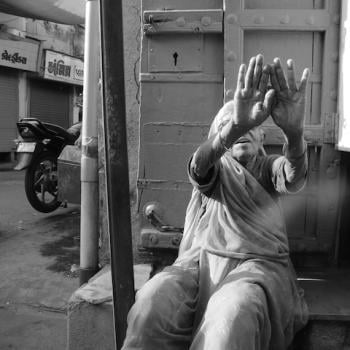
“I will follow you wherever you go,” people told Jesus (Luke 9:51-62). But then they hedged, thinking of what needed doing, of what others might think if they went all-in with the spiritual life. In a family-oriented culture like that of the Mediterranean, people thought of family obligations: I must go and bury my father; I must say goodbye to those at home. In the story in Luke, Jesus says, “Let the dead bury their own dead.” In modern American society, where people are motivated by primary concerns other than extended family, we might hear: First, I must finish my degree. First, I must buy a house. First, I must reach a level of success, then I can follow. In the meantime, ascending the social ladder requires my focus and I don’t have time for the faith life. Certainly, we are motivated by cultural scripts we accrue as we grow up, and these motivations are strong and unseen. We think, I will follow, but first I must do this or that.
However, I want to mention a different motivation for why we ignore the call to a life of faith, or to trust in Spirit. Often it is, first I need to BE this or that. First, I need to be good enough. First, I need to reach a level of spiritual or moral perfection, then I can dedicate myself to the practice of trust. I cannot possibly be a deeply spiritual person right now, at this juncture of my life, because I am too fill in the blank. I am too anxious and worrisome. I am too lustful. I am too angry. I am too jealous. I am too addicted or I drink too much. I am too whatever. Really, I think this kind of excuse is more often a barrier to the faith life. Many of us have been led to believe that before we can approach the Divine, we need to reach a level of moral purity.
I’m here to tell you the opposite. In my experience (and the experience of most people I know well), the times I’ve felt closest to God are when I was at my most imperfect—when I was flailing around and breaking things, when I was making my worst mistakes. I could tell of times in earlier adulthood when I was in incredibly unwise relationships, where I became so disoriented and reckless—whether for lust or love, or both, that I stumbled around like a drunk person. But when in those situations things started to devolve, I usually felt so desperately afraid that I tuned in to Spirit. And more than at any other juncture of my life, the embrace of Love I received at those moments was total and over time, transforming. I never felt a hare’s breath of distance from God because of my mistakes and imperfections; nor did I feel that Love’s or God’s embrace was contingent on my snapping out of it and becoming perfect and pure. God’s love was there because God’s love is there. The embrace of Spirit is perhaps experienced most powerfully when we are at our lowest.
Yet at these times, we do have to tune in. We have to be honest with ourselves about how desperate and alone we feel, or we keep ourselves isolated. As a young person, I was often so crippled by shame and so wrong-headed about God because of skewed messages I’d accrued, that I refused to tune in to the Divine. Instead, I remained isolated and alone in my pain. I think this is the tragedy at the heart of Luke’s story. That sometimes we so misunderstand what we really need, what life really wants to give us, that we keep ourselves cut off from the Source.
I want everyone to be free for honesty with God, free to come to God with absolutely all that we are—all of our flaws and addictions and anxieties and brokenness. I believe not only that God meets us there, but that God wants to show us how much we are loved. And it is experiences of love when we are at our worst that clearly show us the depth of acceptance and embrace available to us. In a sense, we actually need to be at our worst to fully experience it. And I’m afraid people who are so devoted to being perfect, to projecting perfection, that they are not honest with themselves about their brokenness—these people, in my experience, most doubt Divine acceptance. Deep down, they think the spiritual life is about jumping through moral hoops, even if they wouldn’t say this out loud.
I invite everyone to bring to God their imperfections, mistakes, everything. Not in a groveling posture, but so that God can love us. Because a force of love and transformation is what God is. Full stop.

















